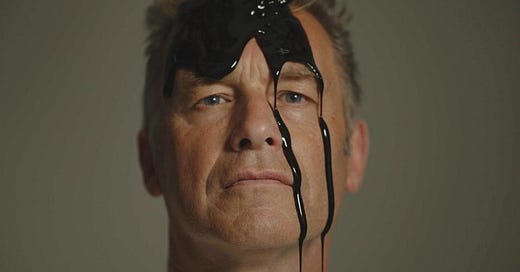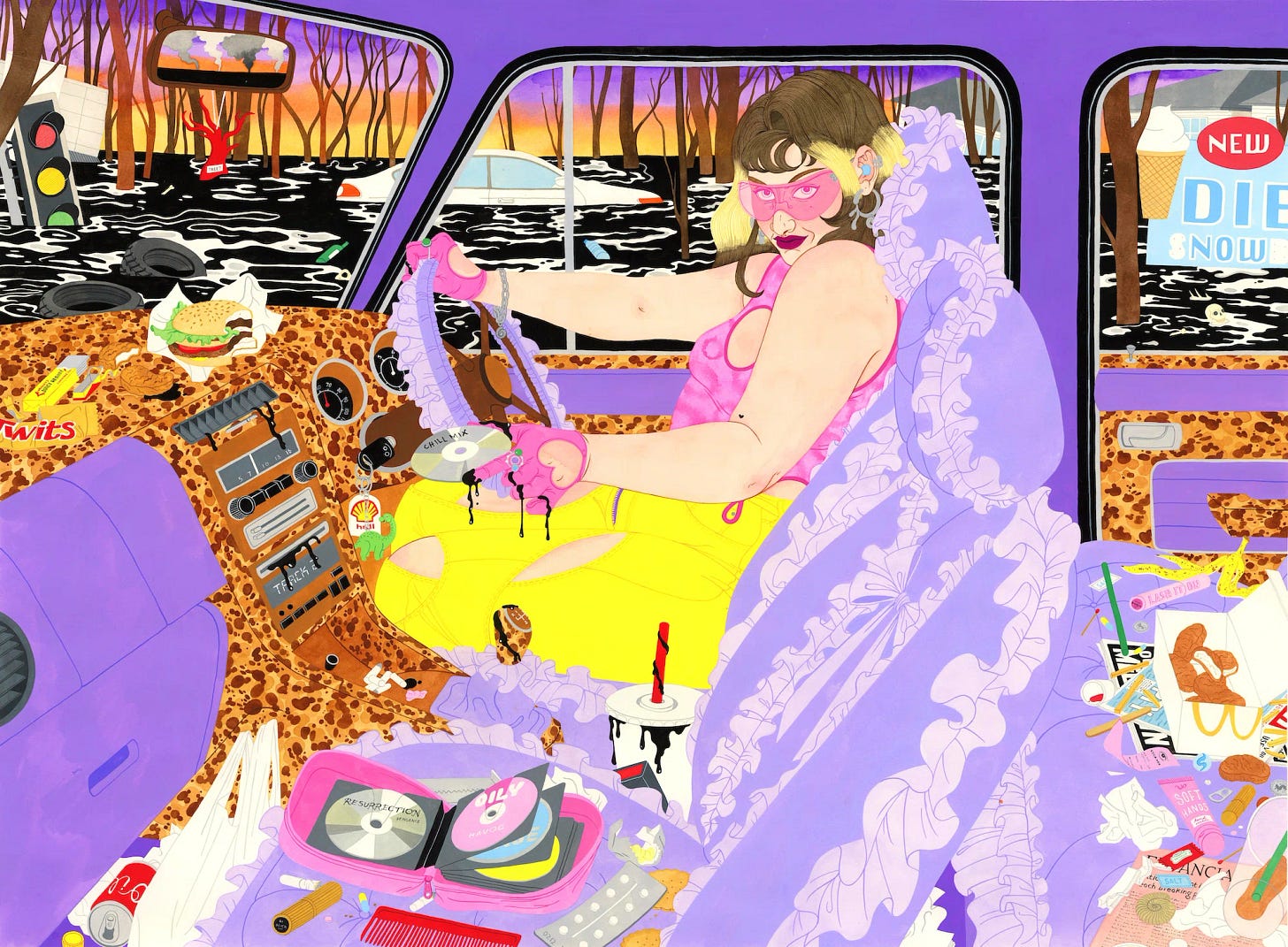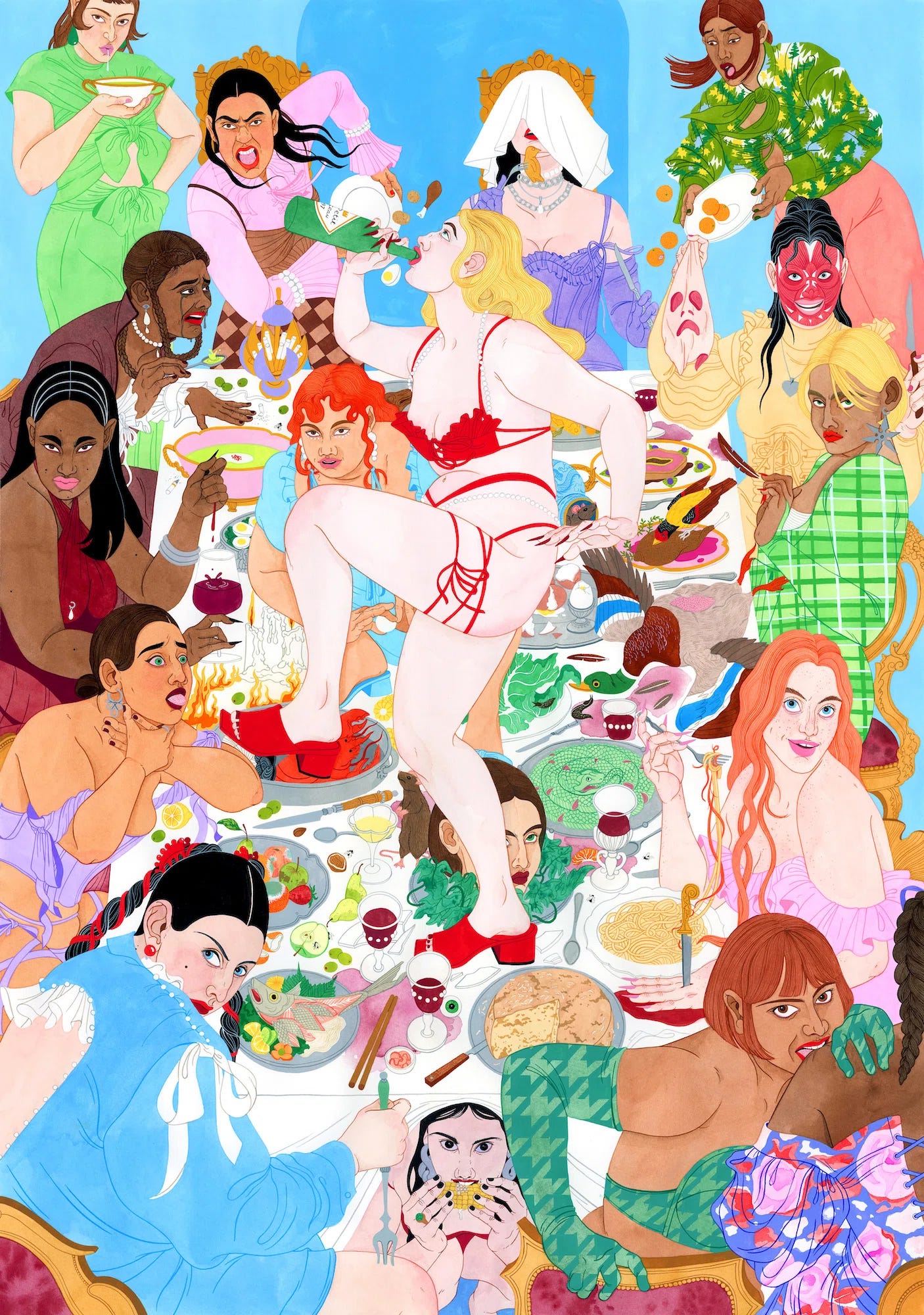23 September 2023. Climate | Dystopia
Breaking the law in response to climate change // Eating and drinking at the end of the world
Welcome to Just Two Things, which I try to publish three days a week. Some links may also appear on my blog from time to time. Links to the main articles are in cross-heads as well as the story. A reminder that if you don’t see Just Two Things in your inbox, it might have been routed to your spam filter. Comments are open. Have a good weekend!
1: Breaking the law in response to climate change
(Chris Packham, ‘Is is time to break the law?’. Image: Channel 4)
The Marxist literature critic Raymond Williams once described TV as “flow”. He was writing in the days when you had to watch everything live, as it was broadcast, before even VCR was invented, and obviously we don’t watch TV like that so much any more. (Even though we use the word ‘streaming’).
But there is a deeper truth all the same in Williams’ account: that sense that all television washes past us, each of its genre conventions so tightly defined that nothing ever surprises us or breaks out of the screen.
Watching Channel 4’s documentary ‘Is it time to break the law?’, about the limits, or not, of environmental protest, was for these reasons and others a complete surprise. It was presented by Chris Packham, who for non-British readers is a well known and well loved television naturalist who has co-presented a regular nature programme on the BBC for years.
The first sequence of the programme, even before the credits, has him talking direct to the camera, face filling much of the screen, about the fossil fuel industry. While he talks, something that looks like oil drips down his face and eventually covers it completely. He’s telling a story, talking to you, not at you. (A viewer recorded some of this on their TV set and posted it to Twitter).
Quite apart from the content of what he is saying—for when did you last hear someone on mainstream television quietly and authoritatively condemn the fossil fuel industry, and certainly without being interrupted by someone?—these were also deliberate formal strategies designed to disrupt our flow, to focus attention, to tell us that this programme wasn’t just television.
The director, Adrian Sibley, knew what he was doing, in other words. I’d love to be able to show some examples here, but there are few clips online, for whatever reason. But if you click on Sibley’s site, there a short embedded clip of Packham from the documentary that gives a flavour of the style.
The timing could not have been better, or worse, depending on how you look at it. It was scheduled for Climate Week, of course, but it ended up being shown on the same day that the British Prime Minister Rishi Sunak decided to trash his reputation by walking back a number of British government commitments on climate change, thinking there might be some narrow party political advantage in so doing.
(Generally the view so far is that this is a political miscalculation, but one thing we have learned about Sunak is that he has no political judgment.)
It’s hard for me to remember ever watching a programme in which a well-known television presenter talks to people about whether he will need to break the law because the government is not taking a serious issue seriously enough.
Other people have written about the programme (Guardian review here: Big Issue review here).
Some of the background to this is that Packham, in his early 60s now, has done all the conventional forms of protests about climate change. He went to COP26 in Glasgow in 2021, and says he came back “clinically depressed”, partly because he had realised that this activism had had no effect.
So it is worth tracing the intellectual thread that it followed, from the mainstream out to the edge. He starts with Lord Deben, as the Conservative politician John Gummer is now called, who chairs the UK’s Climate Change Commission. Deben is critical of the government, and concerned by how slowly we are moving to address climate change, and says
We really should be on a war footing, because this is going to act like war… A whole generation of people are waking up to the fact that we have destroyed their future.
But—as an unelected member of the British Parliament—he draws the line very firmly at breaking the law.
Peter Lilley, another British peer, who sits on the House of Lords Select Committee on Environment and Climate Change, is more sceptical. (I met Lilley a few times in the 1980s when I was a financial journalist and he was a hardline monetarist economist.)
I think the world has been made richer by consuming fossil fuels,
he tells Packham. And of course, this is almost certainly the best single explanation of 150 years of economic growth since the mid-19th century. Climate change, he suggests, does exist but it is exaggerated.
The film interleaves this with the world of Just Stop Oil and their slow marching protests, which disrupt traffic, and Packham follows two protesters who are setting out to smear paint across the front of the right-wing think tank Policy Exchange, and then will wait, on camera, to be arrested.
The Policy Exchange is shadowy, to say the least. Its funders are almost completely secretive, although we know that it has received money from Exxon. It is a target for the protestors because it helped draft the legislation that the government has used to crack down on climate protesters.
The third part of this triad is a visit to Marcus Decker, one of two Just Stop Oil protesters who climbed the Dartford Bridge and shut it to traffic for 40 hours. They received sentences of three years and two years and seven months respectively, the longest ever handed out for peaceful protest in the UK. The sentences have since been upheld in the Appeal Court. So he is travelling with Decker’s partner, to visit him in his relatively high security jail, after the Governor of the prison turned down repeated interview requests.
The protest strategy discussion is woven around this. He visits (by train) Andreas Malm, in Sweden, whose book How to blow up a pipeline (which I discussed here last year) is not a manual. Malm does not think there is any point in disrupting traffic. He says that activists should instead target fossil fuel infrastructure:
Pipelines are part of the problem. So people in the climate movement should disrupt them... disrupt their construction, yes, and maybe blow them up.
He points to a recent successful action of this kind in Portugal. Packham responds by saying:
If we do blow up pipelines and we do get caught, we’re going to take a beating from the state.
To which Malm says:
Sure. That’s a big risk... You can end up in jail for decades.
The opposite view of the strategy here is put by Roger Hallam, who co-founded Extinction Rebellion and Just Stop Oil. Packham asks him if the Just Stop Oil protests are effective, and Hallam answers:
They may be, it’s hard to tell. Social systems are not like car engines, that’s not how society works... If you want to ask me will we get there in time, I don’t know.
Hallam’s version of how social change works has been criticised by people who are sympathetic to his aims, but his model of change is this:
What’s happened over and over again in history is that everything looks hopeless, and you look as if you’re getting nowhere, and then you have a trigger event and there is a massive change.
Unlike Malm, Hallam is completely committed to non-violence. He talks about Gandhi and the Salt March: “ordinary people who have had enough”.
Of course, Packham puts Malm’s argument to Hallam, and we see him taking time to think about it, on screen—another way in which the documentary is willing to make the viewer a little uncomfortable with the form. It’s worth sharing his response to this, I think:
I’m going to make a proposition to you, that society’s basically a community, it’s a community of love, it’s a community of morality, it’s a community of connection... what public disruptive non-violent action does is pricks the conscience. It’s not about blowing things up.
Hallam’s model is close to the famous essay that Vaclav Havel wrote about how support for dominant regimes collapses—effectively its power drains away.
Just Stop Oil put a couple of clips together from the Malm and Hallam sequences on youtube:
This piece is already too long, and I can see both sides of this argument. I do think it’s necessary to control Big Oil, and to stop governments subsidising fossil fuels, and given their scale I’m not sure what we’re going to have to do make that happen.
As Christiana Figueres wrote recently about the oil industry ought to be spending its current record profits:
stepping away from any new oil and gas exploration, investing heavily into renewable energies and accelerating carbon capture and storage technologies to clean up existing fossil fuel use... Instead, what we see is international oil companies cutting back, slowing down or, at best, painfully maintaining their decarbonisation commitments... and – in some countries – lobbying governments to reverse clean energy policies while paying lip service to change.
I suspect that in the face of their intransigence, we’ll see both an increasing scale of peaceful disruption, as the climate crisis heats up, and also violence.
I’m also not going to spoil the programme for people who have the chance to see it on Channel 4’s streaming service by revealing his conclusion.
But it was a pleasure to watch a programme on mainstream television that felt like someone exploring a difficult issue in an open way; having conversations with his interviewees, instead of interviews; and talked about people concerned with climate change as “we”.
2: Eating and drinking at the end of the world
'How will it be, the end of the world?’, the British comedian Peter Cook was asked in a famous sketch, which I have popped in at the end of this piece.
And the answer comes in an exhibition called ‘Apocalypse Chow’ in Dublin by the artist Laura Cunningham: it will involve gluttony and excess. The article, by Olivia Hingley, is on It’s Nice That. Cunningham is interested in food, and a lot of these paintings feature details of food, some quite unpleasant.
((C) ‘Vroom (The dead rise...)’, 2023, Laura Cunningham)
The primary visual inspiration for the Apocalypse Chow came from historical representations of Doomsday, and the 15 signs that precede it – as often referenced in texts from the Middle Ages. “I wanted the paintings to reflect my own modern day signs of the apocalypse,” says Laura, “because a lot of what we’re experiencing right now does feel like the end of time.”
The article spends some time discussing a painting that it thinks represents the spirit of the exhibition, ‘Bacchanal (The animals will feast...)’.
((C) Laura Cunningham, 2023, ‘Bacchanal (The animals will feast...)’
Obviously the Bacchanalia was an unofficial Roman festival that was marked by consumption of massive amounts for food and drink, to reduce inhibition.
At both ends of the table, the figures are eating foods that are banned. At the head, the character with a napkin over her head is about to eat an Ortolan:
an Ortolan bird is force fed, drowned in Armagnac, cooked and then eaten whole – bones and all.
At the other end, is a round of the Sardinian Casu Martzu cheese:
the cheese is fermented to the point of decomposition, where it becomes infested with maggots which are scraped off before eating.
Eating it involves a risk of death, which sounds like it ought to be a metaphor for something.
For Laura, such culinary over-indulgence is still as present in today’s society – a fact the piece aims to highlight. She cites creations like the competitive over consumption of Man V. Food, a TV series that leaves a sour taste for Laura when considering the current cost of living crisis and the subsequent rising costs of food.
Sadly, the exhibition seems to have closed already, but prints and painting are still available from the gallery’s online store.
From Beyond The Fringe
j2t#499
If you are enjoying Just Two Things, please do send it on to a friend or colleague.





